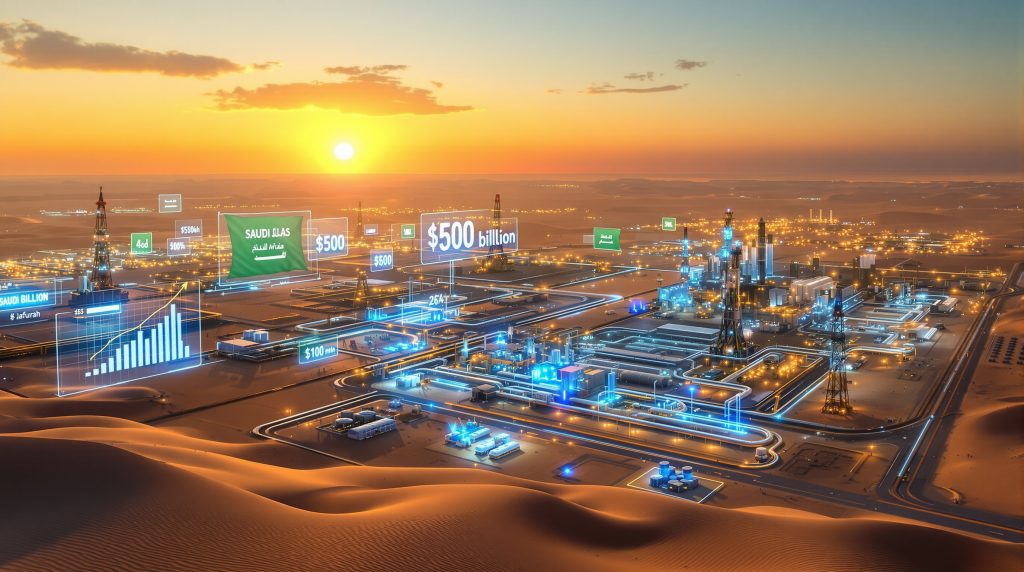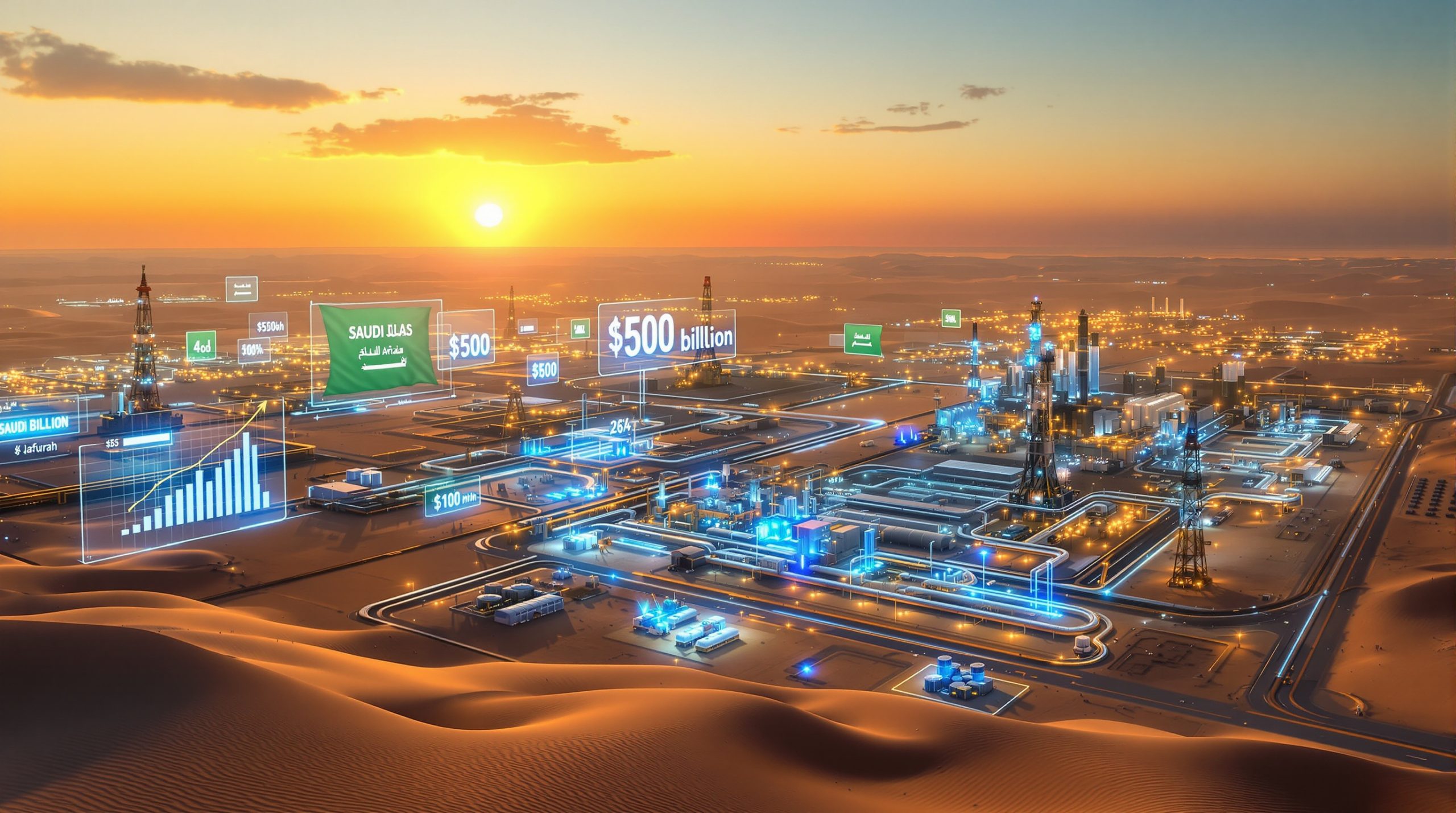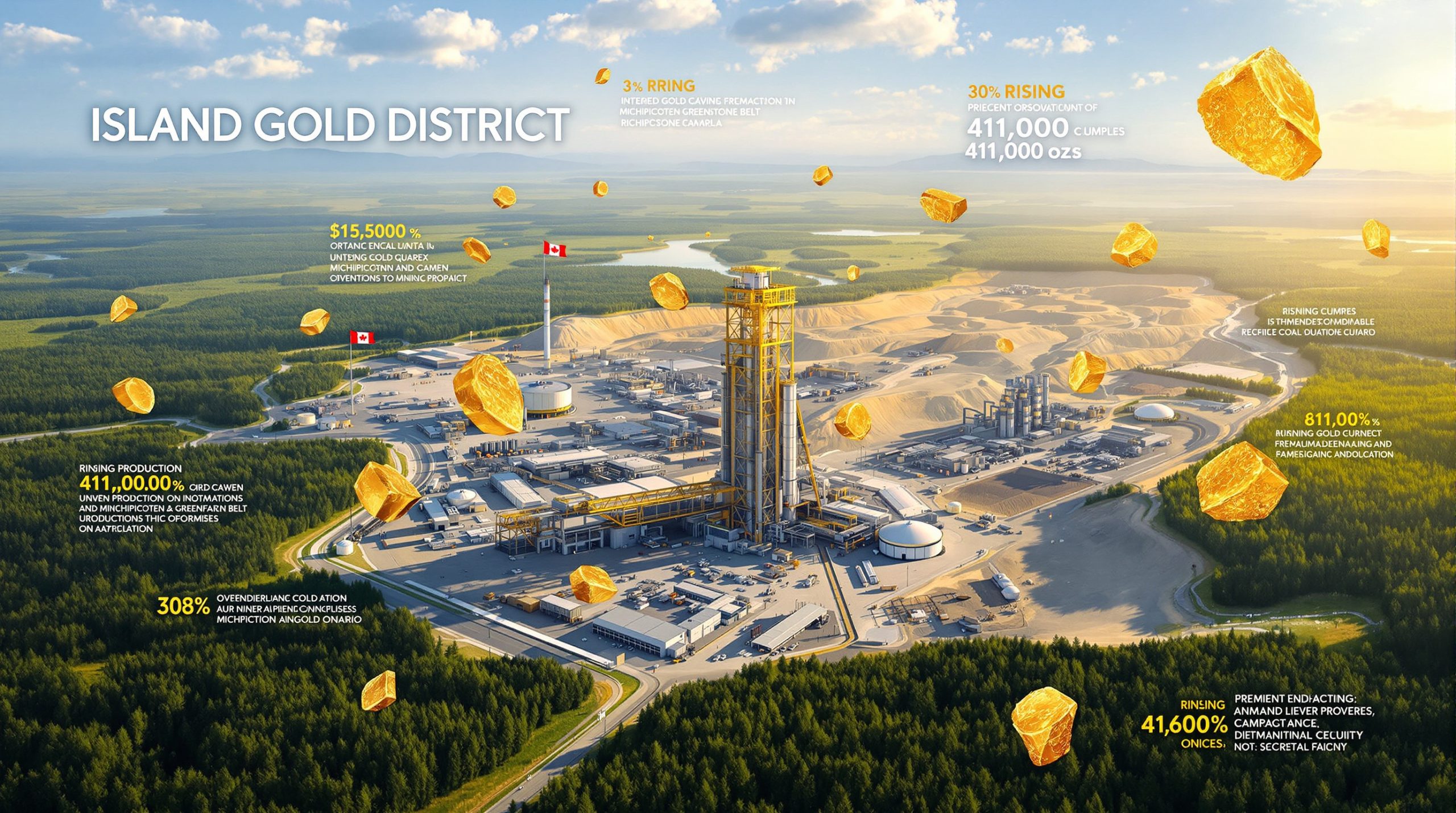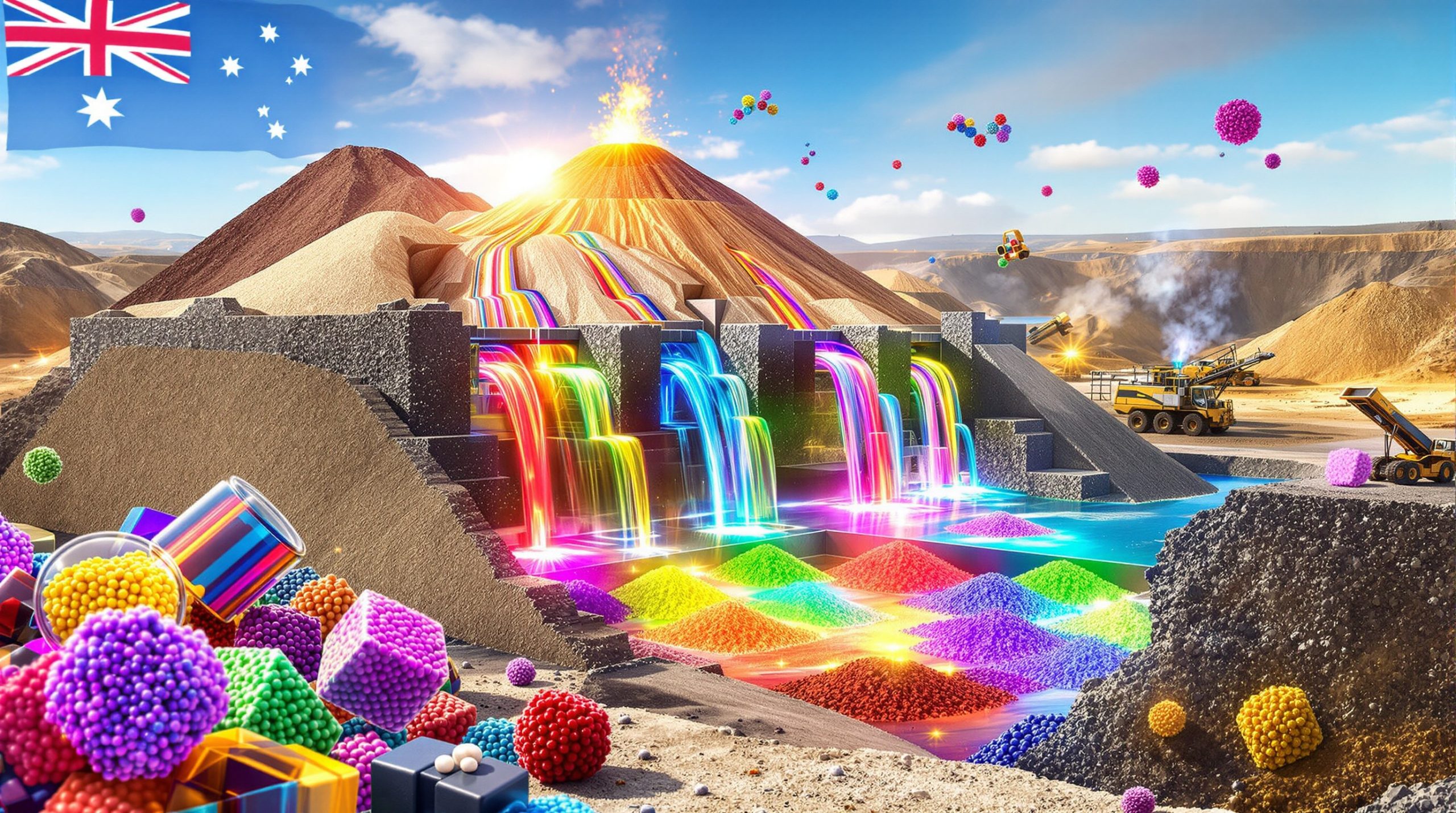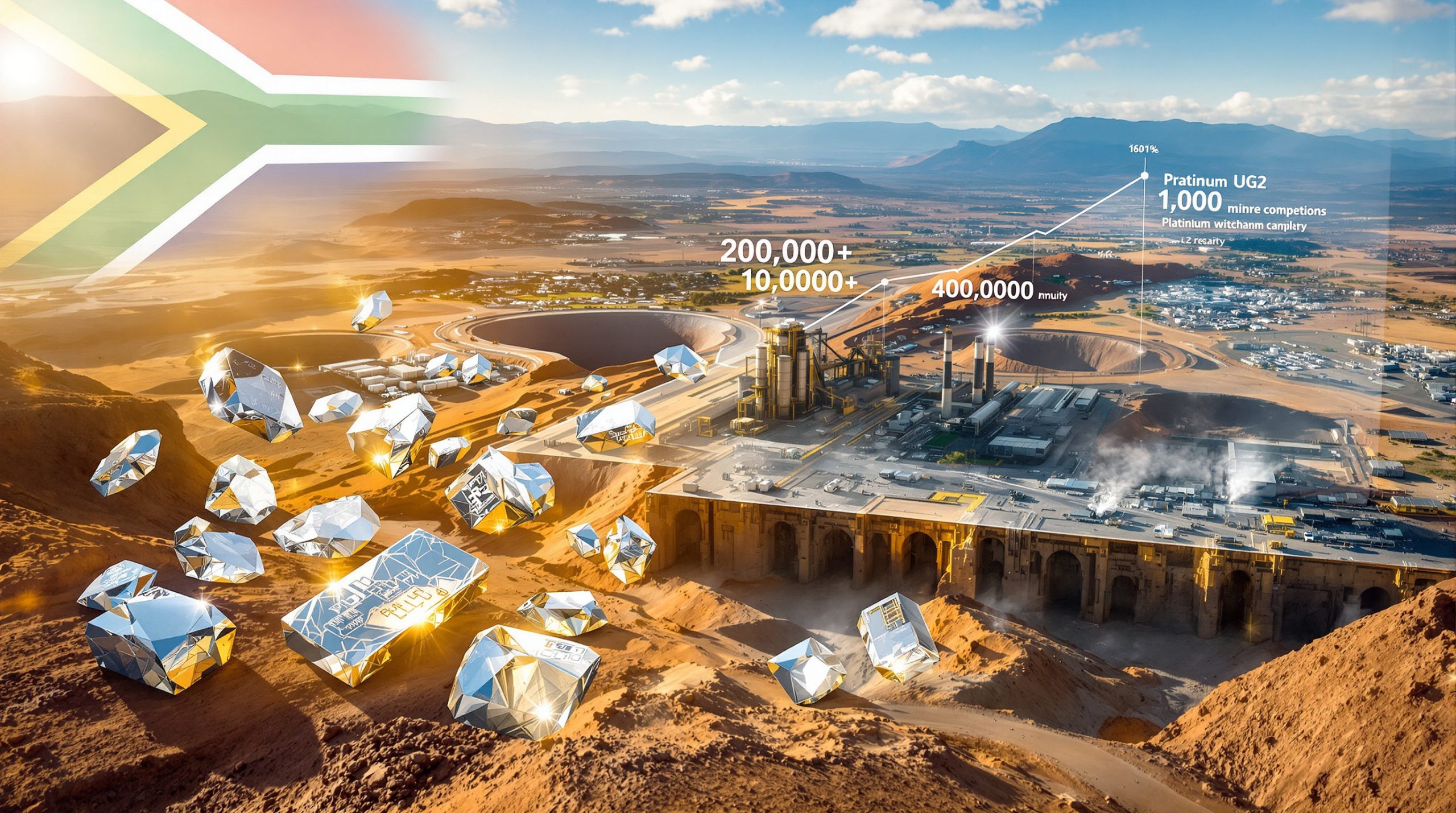What is the Jafurah Gas Field and Why Does It Matter?
The Jafurah Basin represents Saudi Arabia's largest unconventional gas development and stands as the most significant gas project outside North America. Located in Saudi Arabia's Eastern Province, approximately 400 kilometers east of Riyadh, this massive field spans an area roughly 170 kilometers long by 100 kilometers wide.
The field's strategic importance stems from its extraordinary reserves, estimated at 229 trillion standard cubic feet of raw gas and 75 billion barrels of condensate. These resources position Jafurah as a cornerstone of Saudi Arabia's energy diversification strategy and a key component of the Kingdom's Vision 2030 economic transformation plan.
How Does Jafurah Fit Into Saudi Arabia's Energy Transition?
Shifting From Oil Dependency to Gas Leadership
For decades, Saudi Arabia has relied heavily on its vast oil reserves as the foundation of its economy. However, the Jafurah project represents a significant pivot in the Kingdom's energy transition strategies. By developing this massive gas resource, Saudi Arabia aims to:
- Reduce domestic oil consumption for power generation
- Lower carbon emissions by substituting natural gas for oil
- Create a more diversified energy portfolio
- Support industrial growth with cleaner energy sources
The project aligns with Saudi Arabia's commitment to achieve net-zero emissions by 2060 and supports Aramco's own target of reaching net-zero operations by 2050. By replacing approximately 300,000 barrels of oil per day currently used for domestic energy with cleaner-burning natural gas, the Kingdom can both reduce emissions and preserve more valuable oil for export.
Economic Diversification Beyond Traditional Oil Exports
Jafurah's development extends beyond energy security to economic transformation. The project is expected to:
- Create thousands of direct and indirect jobs
- Stimulate local manufacturing and services
- Develop domestic expertise in unconventional resource development
- Generate approximately $8.6 billion in annual GDP contribution at peak production
What Makes the Jafurah Development Technically Challenging?
Unconventional Gas Extraction Techniques
Unlike conventional natural gas fields, Jafurah represents an unconventional resource that requires specialized extraction methods:
- Horizontal drilling technology to access thin gas-bearing layers
- Multi-stage hydraulic fracturing to create pathways for gas flow
- Advanced well completion techniques to optimize production
- Water management systems for sustainable operations
These technical challenges have required Aramco to develop new capabilities and adapt technologies pioneered in North American shale plays to Saudi Arabia's specific geological conditions.
Environmental Considerations and Water Management
The development of Jafurah presents significant environmental challenges, particularly regarding water usage in a water-scarce region:
- Implementation of water recycling and treatment facilities
- Monitoring of potential groundwater impacts
- Minimization of surface footprint through multi-well pad drilling
- Reduction of methane emissions through leak detection and repair programs
How is the $100 Billion Jafurah Project Being Financed?
The BlackRock Partnership and Infrastructure Investment
In August 2023, Aramco secured a landmark deal with a consortium led by Global Infrastructure Partners (GIP), a BlackRock company, involving:
- An $11 billion lease-and-leaseback agreement for midstream assets
- Creation of Jafurah Midstream Gas Company (JMGC) with Aramco holding 51% and the GIP consortium holding 49%
- A 20-year operational agreement for the midstream infrastructure
This innovative financing structure has recently been supplemented by a $10.3 billion loan package arranged through multiple international financial institutions, including:
- JP Morgan
- Sumitomo Mitsui Banking Corporation
- Citigroup
- Mitsubishi UFJ Financial Group
- Mizuho Financial Group
The loan package reportedly consists of a seven-year facility that could potentially be refinanced through bond markets and a longer 19-year facility aligned with the project's operational timeline.
Project Phases and Capital Allocation
The $100 billion total investment will be deployed across multiple phases:
| Phase | Timeline | Key Developments | Approximate Investment |
|---|---|---|---|
| Phase 1 | 2021-2025 | Initial production facilities, processing capacity of 1.1 Bcfd | $25-30 billion |
| Phase 2 | 2025-2028 | Expansion of processing capacity, additional compression facilities | $30-35 billion |
| Phase 3 | 2028-2035 | Full field development, reaching 2+ Bcfd capacity | $35-40 billion |
What Infrastructure Is Being Developed for the Jafurah Project?
Gas Processing and Transportation Network
The project encompasses extensive infrastructure development:
- A central gas processing plant with initial capacity of 1.1 billion cubic feet per day
- Natural gas liquids (NGL) fractionation facilities in Riyas
- A 320-megawatt cogeneration plant providing electricity and steam
- Approximately 1,500 kilometers of gathering and transmission pipelines
- Compression stations to maintain gas pressure throughout the system
Integration with Saudi Arabia's Master Gas System
Aramco has awarded contracts worth $8.8 billion to expand the Kingdom's Master Gas System, which will:
- Increase total system capacity by an additional 3.15 billion cubic feet per day by 2028
- Add approximately 4,000 kilometers of new pipelines
- Install 17 new gas compression trains
- Connect Jafurah production to industrial centers and power plants across the Kingdom
How Will Jafurah Production Impact Global Energy Markets?
Domestic Consumption vs. Export Potential
Initially, Jafurah's production will primarily serve domestic Saudi needs:
- Replacing oil in power generation (approximately 300,000 barrels per day)
- Supporting industrial expansion, particularly petrochemicals
- Enabling the Kingdom's goal of generating 50% of electricity from gas and 50% from renewables
However, as production scales up, export potential emerges through:
- Potential LNG development for international markets
- Increased petrochemical exports derived from gas feedstock
- Possible pipeline exports to neighboring countries
Regional Gas Market Dynamics
The development of Jafurah will significantly alter Middle Eastern gas market dynamics:
- Reducing Saudi Arabia's potential need to import gas
- Creating new regional supply options
- Potentially competing with Qatari and other regional gas exports
- Supporting industrial development throughout the Gulf Cooperation Council
What Technologies Are Being Deployed at Jafurah?
Digital Innovation and Fourth Industrial Revolution Applications
Aramco is implementing cutting-edge technologies throughout the Jafurah development:
- Industrial Internet of Things (IIoT) sensors for real-time monitoring
- Advanced analytics for production optimization
- Artificial intelligence for predictive maintenance
- Digital twins of facilities for operational excellence
- Automated drilling systems for improved efficiency and safety
Environmental Monitoring and Sustainability Technologies
The project incorporates numerous technologies to minimize environmental impact:
- Advanced leak detection and repair systems
- Real-time emissions monitoring
- Water recycling and treatment facilities
- Energy-efficient equipment and processes
- Carbon capture utilization and storage (CCUS) potential
What Challenges Does the Jafurah Project Face?
Technical and Operational Hurdles
Despite Aramco's expertise, several challenges remain:
- Adapting North American unconventional gas techniques to Saudi geological conditions
- Managing water resources in a water-scarce environment
- Optimizing well productivity and reducing decline rates
- Scaling operations while maintaining cost efficiency
Market and Economic Considerations
The project faces several market-related challenges:
- Global natural gas price volatility affecting project economics
- Competition from other global gas developments, including U.S. LNG
- Balancing domestic pricing with international market rates
- Ensuring adequate return on the massive $100 billion investment
Geopolitical and Regional Security Concerns
The Middle East's ongoing instability presents additional challenges:
- Regional conflicts potentially affecting development timelines
- Maritime security for potential LNG exports
- Changing global energy alliances and partnerships
- International climate policy impacts on long-term gas demand
What is the Timeline for Jafurah Development?
Key Milestones and Production Targets
The project follows an ambitious but measured development schedule:
| Year | Milestone | Production Target |
|---|---|---|
| 2021 | Project sanctioning and initial development | – |
| 2022-2024 | Infrastructure construction and initial drilling | – |
| 2025 | First gas production | ~400 million cubic feet per day |
| 2027 | Phase 1 completion | ~1.1 billion cubic feet per day |
| 2030 | Phase 2 completion | ~2 billion cubic feet per day |
| 2035 | Full field development | ~2.2+ billion cubic feet per day |
Long-term Production Profile
The field is expected to maintain significant production for decades:
- Plateau production of approximately 2.2 billion cubic feet per day
- Estimated field life of 25+ years at commercial rates
- Potential for enhanced recovery techniques to extend production
- Gradual decline phase managed through additional drilling and workover operations
How Does Jafurah Compare to Other Global Gas Developments?
Scale and Investment Comparison
The $100 billion Jafurah development ranks among the world's largest energy projects:
| Project | Location | Investment | Resource Size |
|---|---|---|---|
| Jafurah | Saudi Arabia | $100 billion | 229 trillion cubic feet |
| North Field Expansion | Qatar | $28.75 billion | Part of 1,760 trillion cubic feet |
| Arctic LNG 2 | Russia | $21.3 billion | 1.5 trillion cubic feet |
| Mozambique LNG | Mozambique | $20 billion | 75 trillion cubic feet |
| Papua LNG | Papua New Guinea | $10 billion | 10.3 trillion cubic feet |
Production Impact Relative to Global Supply
When fully operational, Jafurah will significantly impact global trade impacts and gas markets:
- Adding approximately 2.2 billion cubic feet per day to global supply
- Representing roughly 0.5% of global natural gas production
- Potentially supporting 15-20 million tonnes per annum of LNG if exported
- Contributing to Saudi Arabia becoming a net gas exporter rather than potential importer
What Are the Environmental Implications of the Jafurah Project?
Carbon Footprint and Emissions Management
The environmental impact of Jafurah presents both challenges and opportunities:
- Natural gas produces approximately 50-60% less CO2 than coal when burned for electricity
- Replacing oil with gas in Saudi power generation could reduce emissions by 30%
- Methane leakage must be carefully managed to preserve climate benefits
- Water usage and disposal require careful environmental stewardship
Integration with Saudi Arabia's Climate Commitments
The project aligns with Saudi Arabia's broader climate goals:
- Supporting the Kingdom's Saudi Green Initiative
- Contributing to Saudi Arabia's circular carbon economy approach
- Complementing renewable energy expansion
- Potentially incorporating carbon capture and storage technologies
What Does Jafurah Mean for Saudi Arabia's Economic Future?
Beyond Oil: Diversification and Economic Impact
The Saudi Aramco Jafurah natural gas project represents more than just energy production:
- Creating an estimated 200,000 direct and indirect jobs
- Developing a domestic supply chain for unconventional gas development
- Supporting manufacturing growth through reliable, affordable energy
- Generating approximately $8.6 billion in annual GDP contribution
Skills Development and Technology Transfer
The project is driving significant knowledge development within Saudi Arabia:
- Training programs for Saudi nationals in advanced drilling and completion techniques
- Development of domestic expertise in unconventional resource management
- Technology transfer from international partners and service companies
- Research and development initiatives at Saudi universities and Aramco's research centers
FAQ: Saudi Aramco's Jafurah Natural Gas Project
What makes Jafurah different from conventional gas fields?
Jafurah is an unconventional gas resource, similar to shale gas plays in North America. The gas is trapped in tight rock formations with low permeability, requiring horizontal drilling and hydraulic fracturing to release the gas. This contrasts with conventional fields where gas flows more readily through porous reservoir rock.
How will Jafurah impact Saudi Arabia's carbon emissions?
By replacing approximately 300,000 barrels of oil per day currently used for domestic power generation with cleaner-burning natural gas, the project could reduce Saudi Arabia's carbon emissions by an estimated 30 million tonnes per year. This represents a significant contribution to the Kingdom's climate goals.
Will Jafurah gas be exported as LNG?
While initial production is targeted for domestic consumption, Saudi Arabia has indicated interest in potentially developing LNG export capabilities as production increases. The Kingdom's strategic location between European and Asian markets would provide favorable export economics if such facilities are developed.
How does water scarcity affect the Jafurah development?
Water management is a critical challenge for the project. Hydraulic fracturing requires significant water volumes, which is challenging in Saudi Arabia's arid environment. Aramco is implementing extensive water recycling systems and exploring alternative fracturing technologies to minimize freshwater usage.
What role will international companies play in Jafurah's development?
While Aramco leads the project, international service companies provide specialized technologies and expertise. Additionally, international investors like BlackRock's Global Infrastructure Partners have taken significant financial stakes in the project's midstream infrastructure, demonstrating global confidence in the development.
Further Exploration:
Readers interested in learning more about Saudi Arabia's natural gas development can also explore related educational content from Oilprice.com, which offers industry perspectives on major energy projects and developments in the Middle East. The development of Jafurah also creates new opportunities for investors considering capital raising strategies and Saudi exploration licenses as the Kingdom continues to reshape oil market dynamics in the region.
Ready to Stay Ahead of Major Resource Discoveries?
Discover potential market-moving mineral findings before they hit mainstream headlines by visiting the Discovery Alert discoveries page, where our proprietary Discovery IQ model transforms complex exploration data into actionable investment insights for traders and long-term investors alike.
